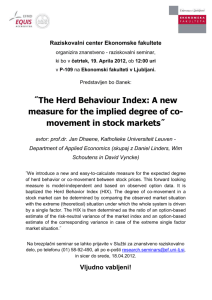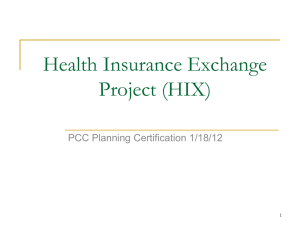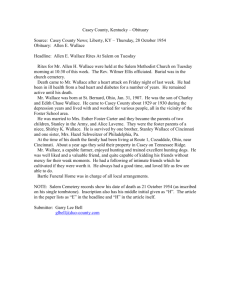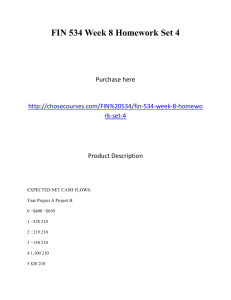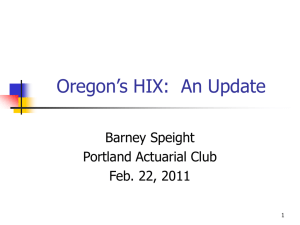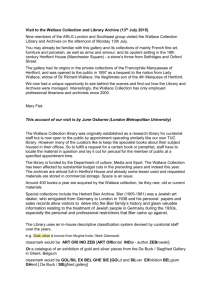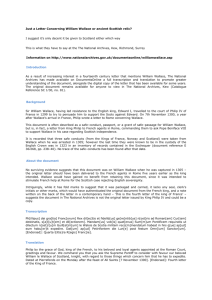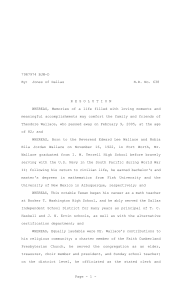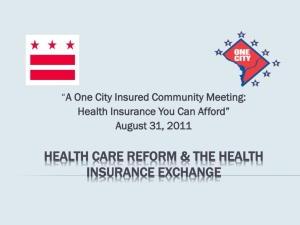VI. The Future of European Integration
advertisement
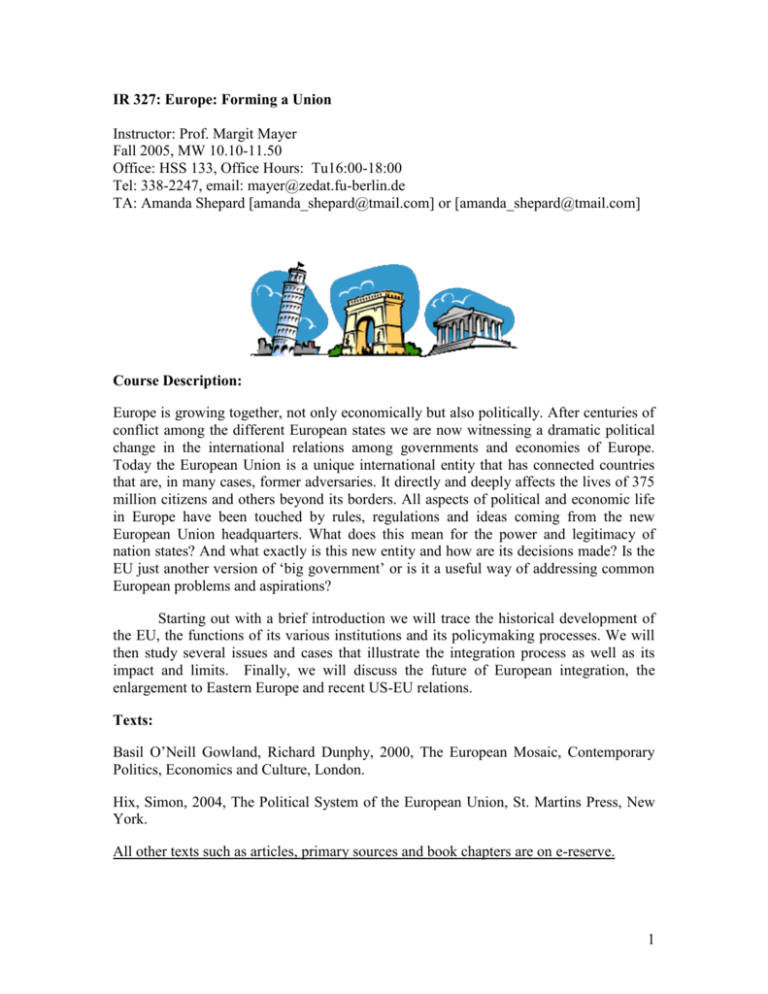
IR 327: Europe: Forming a Union Instructor: Prof. Margit Mayer Fall 2005, MW 10.10-11.50 Office: HSS 133, Office Hours: Tu16:00-18:00 Tel: 338-2247, email: mayer@zedat.fu-berlin.de TA: Amanda Shepard [amanda_shepard@tmail.com] or [amanda_shepard@tmail.com] Course Description: Europe is growing together, not only economically but also politically. After centuries of conflict among the different European states we are now witnessing a dramatic political change in the international relations among governments and economies of Europe. Today the European Union is a unique international entity that has connected countries that are, in many cases, former adversaries. It directly and deeply affects the lives of 375 million citizens and others beyond its borders. All aspects of political and economic life in Europe have been touched by rules, regulations and ideas coming from the new European Union headquarters. What does this mean for the power and legitimacy of nation states? And what exactly is this new entity and how are its decisions made? Is the EU just another version of ‘big government’ or is it a useful way of addressing common European problems and aspirations? Starting out with a brief introduction we will trace the historical development of the EU, the functions of its various institutions and its policymaking processes. We will then study several issues and cases that illustrate the integration process as well as its impact and limits. Finally, we will discuss the future of European integration, the enlargement to Eastern Europe and recent US-EU relations. Texts: Basil O’Neill Gowland, Richard Dunphy, 2000, The European Mosaic, Contemporary Politics, Economics and Culture, London. Hix, Simon, 2004, The Political System of the European Union, St. Martins Press, New York. All other texts such as articles, primary sources and book chapters are on e-reserve. 1 Requirements and Grading: This class is an upper undergraduate seminar. You need to keep up with all readings to understand class lectures, discussions and presentations. Class Participation: 20% -- attendance, discussion, paper outlines etc. Presentation: 20% -- it is required that you schedule a meeting before your presentation. The News Journal: 20% -- it is required that you regularly read at least one national US newspaper, such as NY Times, Washington Post, LA Times, and a European newspaper or weekly (such as the Economist, the Guardian, Financial Times or, depending on your language skills, a newspaper such as Sueddeutsche Zeitung, El Pais or Le Monde). Start a typed journal with at least one entry a week. Discuss questions related to the course and cite evidence from one or several newspaper sources of that week. Keep an eye on how different national perspectives inform newspaper reporting on specific issues. The journal will be collected and graded twice: First date is October 17, second date of collection is December 5 at the beginning of class. Your journal grade will be the median of the two grading periods. Midterm: 20% -- in class, essay and multiple-choice Final: 20% -- 10 page paper, 1 ½ line spacing, plus full bibliography Map-quiz -- it is required to pass the quiz. You can take the map-quiz as many times as needed. Course Policy: You need to have a working SFSU email account (forward your email if you use another address). If you miss more than 3 classes unexcused your grade drops automatically by a letter grade. No late papers and paper outlines accepted. Penalties for cheating and plagiarism are strict and range from a 0 or F on a particular assignment through an F for the whole course (see University Catalog Policies). Don’t even try it! Schedule and Readings: Date August 24 Text/Author Course syllabus Books/Chapter/Pages content, requirements, 2 I. Foundations: The European States August 29: Introduction European Politics and Economies: Gowland/Dunphy Ch. 1, 2, 3 Gowland/Dunphy Ch. 5 August 31: Introduction September 5: Labor Day (no classes) II. EC/EU Development: September 7: Gowland/Dunphy Ch. 6-8 September 12: The EU history through primary texts: Gowland/Dunphy Ch. 4, Primary Sources on e-reserve (75-77, 146147), (60-61, 152, 231-232) III. EU-Institutions September 14: Executive Politics Dinan Ch. 8-9 September 19: Executive Politics Hix Ch. 2 September 21: Legislative Politics Hix Dinan Ch. 3 Ch. 10 September 26: Judicial Politics Primary Source (e-reserve): Costa v. Enel (1964), Hix Ch. 4 IV. Regulation, Representation and Democracy September 28: Public Opinion and Social Cleavages October 3: Elections and Parties October 5: Ch. 5 Hix Ch. 6 Dinan Gowland/Dunphy Ch. 13 Ch. 10 MIDTERM October 10: The Single Market October 12: Redistribution Hix Hix Primary Source: CAP, p. 180-181, 256 Ch. 9 V. Case Studies: October 17: The Policy Process Wallace and Wallace, Ch. 2. Student Presentations begin: October 19: Agriculture and Mad Cow Disease NYT article, Dinan Ch. 12 October 24: The Euro Hix Ch. 10 3 Primary source: (on reserve) pp. 293295 October 26: Gender Equality Ilona Ostner, Jane Lewis, in: Leibfried/Pierson Ch. 5 October 31: Citizenship T. H. Marshall, Citizenship and Social Class, in: Shafir, p. 93-111. Jeffrey Checkel, 2001, The Europeanization of Citizenship, in: Cowles, Caparaso, Risse, Transforming Europe. November 2: Due: 2-page Outline of Paper November 7: Immigration Schengen-Agreement Patrick Ireland, 1996, Asking For the Moon: The Political Participation of Immigrants in the EU, in: Kourvetaris November 9: Environmental Policy Sbragia in: Wallace and Wallace. Ch.11, November 14: Social Policy Pierson, Leibfried, in: Wallace and Wallace Ch. 10, November 16: Conclusion of the Case-studies: Wallace, in: Wallace and Wallace Ch. 3, Hand in 1 page (typed): Summarize your insights on EU policy systematically VI. The Future of European Integration November 21: Enlargement of the EU Hix Ch. 12 Reading on Eastern Europe, Turkey, TBA November 23: Due: 6-page full Paper-Outline including an annotated Bibliography November 28: US-EU Relations I Dinan Ch. 18 November 30: Advising Day (no class) 4 December 5: US-EU Relations II Current conflicts (UN, Iraq, Israel), R. Kaplan, C. Kupchan (e-reserve) December 7: Past, Present and Future: Where is the EU going? Rifkin, The European Dream (e-reserve) ************************************************************************ Useful Websites: www.eurunion.org, www.europarl.eu.int, www.europa.eu.int 5

